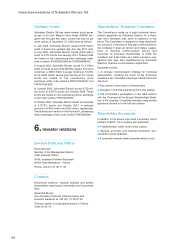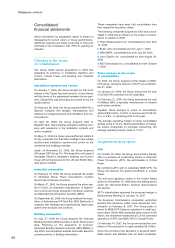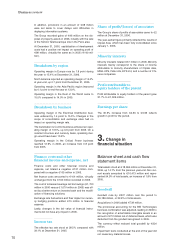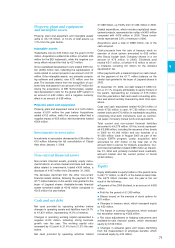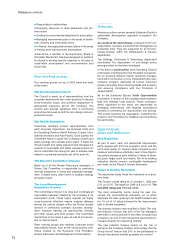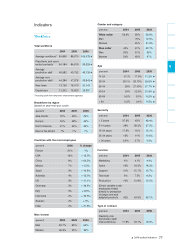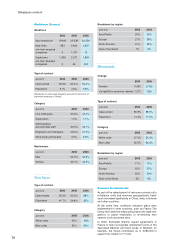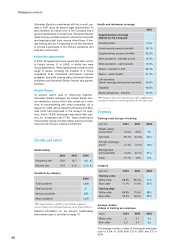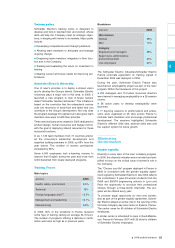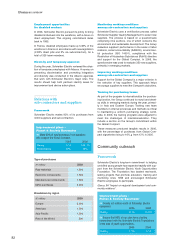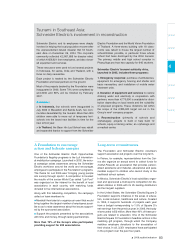APC 2006 Annual Report Download - page 75
Download and view the complete annual report
Please find page 75 of the 2006 APC annual report below. You can navigate through the pages in the report by either clicking on the pages listed below, or by using the keyword search tool below to find specific information within the annual report.
4. Sustainable
development
Introduction
Schneider Electric’s sustainable
development approach
Schneider Electric emphasizes sustainable develop-
ment-related improvement targets in its new2company
program for 2005-2008, demonstrating the depth of its
commitment in this area.
In a world in which energy efficiency has become a
major issue, the Group is leveraging sustainable devel-
opment to differentiate its offer and drive growth.
Schneider Electric has staked out positions in new
markets, such as energy efficiency, building automa-
tion and critical power, that will drive growth in the
years ahead as it supports customers in a way that is
mindful of the environment. The Group’s acquisitions
strategy, R&D processes and sales approach are
designed to support this objective. More than ever,
Schneider Electric is positioning itself as a responsible
partner in energy efficiency.
Responsibility, a key concept in sustainable develop-
ment, is an integral part of Schneider Electric’s corpo-
rate culture and strategy. Because it acts responsibly,
the Group is able to meet the social, economic and
environmental challenges facing it in today’s market-
place.
Schneider Electric published a reference document
entitled
Our Principles of Responsibility
in 2002 to
give all team members a common reference. Similarly,
the Planet & Society Barometer set up in 2005
involves employees around the world in the Group’s
main commitments and allows them to track the action
plans along with other stakeholders.
Framework
Reference documents are distributed throughout the
Group so that all team members can embrace this
responsibility approach and apply it in line with local
culture and legislation.
Principles of Responsibility
In a globalizing world,
Our Principles of Responsibility
provides a framework to guide each team member’s
decisions and actions. The document outlines the
Group’s commitments to each of its stakeholder
groups, including employees, business partners,
shareholders, the community and the planet.
Adopted in late 2002/early 2003,
the Principles of
Responsibility
were drawn up by 600 employees in 15
international working groups. They provide a frame of
reference for each team member and for the Group as
a whole. Failure to comply with these guidelines is con-
sidered serious misconduct.
73
4
Policies
All of the Group’s policies are aligned with
the Princi-
ples of Responsibility.
Environmental issues
In 1992, Schneider Electric published a formal environ-
mental policy. It was revised in 2004 to reflect changes
inside and outside the Group, with the emergence of
new regulations and environmental approaches. The
policy is designed to improve manufacturing process-
es, increase the use of eco-design and integrate cus-
tomers’ concerns in the area of environmental pro-
tection.
Social issues
Our Principles of Responsibility
also serve as a social
charter. In it, the Group clearly states that "All employ-
ees can express their cultural diversity and are man-
aged without discrimination. Team members are
encouraged to develop their team spirit and their new
competencies. At the same time, they are recognized
for their initiatives and risk taking in contributing to the
Company’s growth." Human resources policies gov-
erning diversity, recruitment, international mobility,
training, global compensation, leadership skills and
health were deployed throughout the Group in 2006.
Sustainable development
organization
Planet & Society Barometer
Schneider Electric created the Planet & Society
Barometer in 2005 to measure its corporate social
responsibility performance. With criteria covering peo-
ple, environmental, community and corporate gover-
nance issues, the barometer expresses the Group’s
commitment to promoting sustainable development to
all stakeholders.
The barometer serves three purposes:
It provides a resource for training and raising aware-
ness about sustainable development.
It defines strategic avenues for improvement.
It informs stakeholders of the Group’s results and
performance.
Information on the barometer is available at:
www.barometer.schneider-electric.com
A dedicated organization
Formed in 2002, the Sustainable Development Depart-
ment is responsible for drawing attention to and
explaining the major transformations affecting the
world today. These include environmental protection,
energy-related geopolitical issues, economic and soci-
etal changes and globalization.
The Department and its thirty team members are
responsible for:
Organizing and executing the Group’s sustainable
development priorities.



